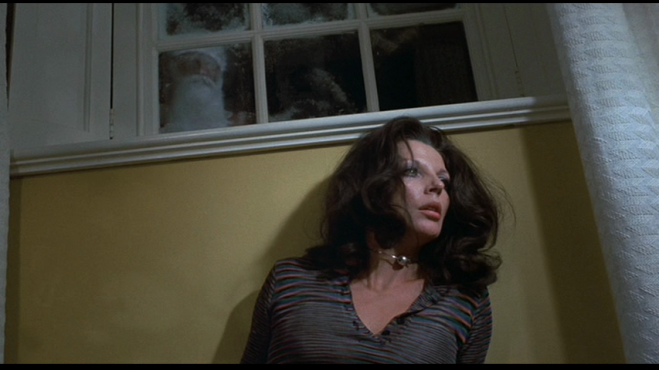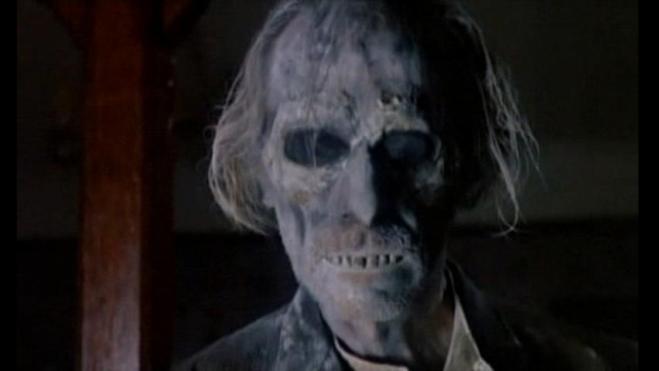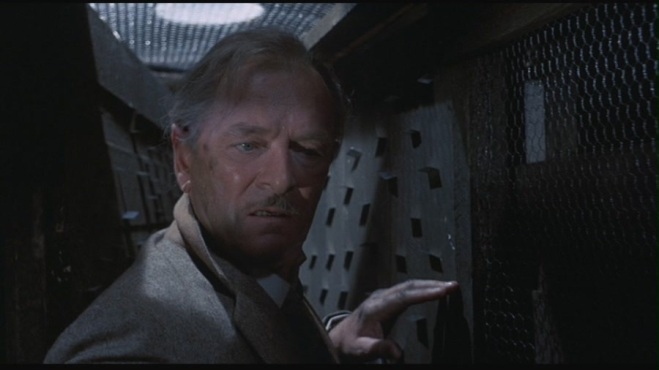
When I chose my first two films to review for this year’s Shocktober, it was more or less random. So it’s only by some weird coincidence that I am once again reviewing a movie directed by Freddie Francis, a guy who I had never heard of before sitting down to watch Trog and now Tales From The Crypt. But I’m kinda glad I was forced to become aware of Francis, since he had a somewhat unique career, as he started out as a cinematographer on films like 1961’s The Innocents and 1960’s Sons And Lovers (for which he won an Oscar), before making the jump to director on horror movies for the British production company Amicus, like The Deadly Bees and Torture Garden (which I can only assume are as good as they sound). And then after getting sick of being labeled as merely a “genre director”, he made the switch back to working as a cinematographer on prestige pictures like The Elephant Man and Glory (for which he would win another Oscar). So it’s been interesting to see the contrast in what Francis could bring to the table on a campy trainwreck like Trog, and then also to a more well-made and enjoyable piece of camp like Tales From The Crypt.
Much like the TV series that would follow in its footsteps, Tales From The Crypt is based on stories from the EC Comics series of the same name, and being that its an anthology movie, I suppose I should just break down each individual story. But as for the film’s set-up, it’s starts with a group of random strangers that have found themselves in the presence of this spooky tomb inhabited by The Cryptkeeper (Ralph Richardson), who’s much doughier and non-corpse-like than the character who would share his name in the TV series. Anyways, he basically tells the five civilians that he’s there to show them the circumstances under which they will all die if they don’t change their ways, which are as follows:
…And All Through The House: The first story centers around a vengeful housewife (Joan Collins) who kills her husband, and then finds her house being stalked by a murderous Santa Claus who’s on the loose. It’s basically as awesome as it sounds, and probably my favorite of these stories, possibly because I’m a sucker for anything that subverts Christmas, but also because its just got a great style to it. Not only does Francis shoot the piece in a coldly Hitchcockian manner, but I also love its unnerving use of Christmas hymns as background music for these murderous acts. And I guess we also have it to thank for laying the groundwork for that movie where a professional wrestler kills people as Santa Claus.
Reflections Of Death: This one’s about a family man (Ian Hendry) who’s not very good at being a family man, and thus heads out joyriding with his mistress before they find themselves in a horrific car wreck. We then see through extended P.O.V. shots the man trying to go back to his family and friends, but they all just scream in horror at his disfigured face (which we can’t see obviously). The use of P.O.V. is kind of inventive for the time I guess, but the reveal and twist at the end aren’t brilliant or anything, and make it probably the most forgettable of the bunch.
Poetic Justice: This one has more of a slow burn to it, but it’s totally worth it in the end. It centers on a local government douche (Robin Phillips) who wants to get rid of a kindly old garbage man (Peter Cushing), because he’s apparently too old and gross to live in their neighborhood. So they decide to concoct a neighborhood smear campaign that leads to the garbage man’s death, as well as (literally) heart-wrenching results. I really liked the ending to this one (in a sick, twisted kind of way of course) and also liked Cushing a lot in it, which made me think that I should probably check out more of those Hammer films that him and Christopher Lee did before becoming unremarkable Star Wars characters.
Wish You Were Here: Actually, now that I think about it, this might be the most forgettable of the bunch. It’s about a slick businessman (Richard Greene) who’s on the edge of financial ruin, while his wife (Barbara Murray) discovers a Chinese statue which will grant them three wishes and hopefully reverse their misfortunes. Unsurprisingly, all of the wishes are granted, but in much more disastrous ways than they’d anticipated. It’s a fairly standard riff on W.W. Jacobs’ The Monkey’s Paw short story, which they namecheck in the movie, and I’d say it’s a case where just because something is self-aware of what it’s paying homage to doesn’t necessarily make it feel any less familiar.
Blind Alleys: And they bring it home with a story about a director (Nigel Patrick) of a home for the blind who makes merciless financial cuts to the home, which results in the death of one of the men who lives there. This then leads to the rest of the blind men plotting their revenge, while being led by one particularly stone-faced blind dude played by Patrick Magee. You might recognize Magee as the furious wheelchair-bound guy from A Clockwork Orange, and he gives a great performance here, as his thousand-yard stare is perfectly suited for a movie of this sort. Also, this in addition to a memorable set piece involving a hallway of razorblades makes Blind Alleys a pretty effective way of capping off the movie.
There’s also a pretty cheesy/awesome use of special effects that plays into the movie’s final twist, which is ridiculous, though I’d say appropriate for a film that never takes itself too seriously. And I guess that’s why I liked this movie. It never goes too far off the deep end into exploitation, but it still knows it’s a little trashy, and somehow manages to do trash in a way that’s both dignified and a lot of fun at the same time. And if there’s one moral I learned from this movie, it’s that you probably shouldn’t try to get rid of your trashman.






Sounds pretty British. I gotta check it out.